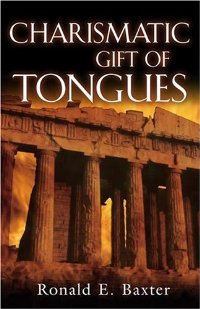Ronald Baxter: Charismatic Gift of Tongues, reviewed by Tony Richie
Pastor-scholar Tony Richie takes on a cessationist critic of glossolalia.
 Ronald E. Baxter, Charismatic Gift of Tongues (Grand Rapids: Kregel, 1981), 149 pages.
Ronald E. Baxter, Charismatic Gift of Tongues (Grand Rapids: Kregel, 1981), 149 pages.
I can think of only two reasons why anyone would want to read this book: as an unavoidable assignment for a book review or to shore up shallow prejudice against Pentecostals and Charismatics. As a blatant example of pseudo-scholarship Baxter’s Charismatic Gift of Tongues indulges in eisegesis rather than engaging in exegesis. Although a show of studying original biblical languages and surveying historical and theological material is made, no serious grappling with the subject of speaking in tongues or its proponents is honestly attempted. The author admits his “longing” that “we shall be saved from the chaos, confusion and myths spread abroad in the [Pentecostal/Charismatic] movement.” He begins with this bias and repeatedly presses it home hard. My problem with Baxter is not just that I disagree with his worn-out repetitions of all the old cessationist tirades that have been debunked and refuted time and time again not only by P/Cs but even by other honest-hearted scholars (e.g., Chad Owen Brand, Perspectives on Spirit Baptism, Broadman and Holman, 2004), but with his totally one-sided and uneven treatment of the entire topic.
Baxter displays appreciation for alliteration with chapters titled “The Recurrence of Tongues in the Bible,” “The Relation of Tongues to Spirit Baptism,” “The Regulation of Tongues at Corinth,” “The Reason for Tongues was a Sign,” “The Removal of Tongues by Maturity,” “The Return of Tongues: Its Source,” “The Relation of Tongues to Interpretation,” “The Record of Tongues is Perilous History,” and “The Result of Tongues is Counterfeit Unity.” The titles are pretty well indicative of content too. For example, Baxter argues that Pentecost was a non-repeatable event never intended to reoccur. That, of course, raises the problem of biblical repetitions of Pentecostal experience after Acts 2. But for Baxter, in a decidedly circular argument, since Pentecost is by definition non-repeatable, then these are considered exceptions that prove the rule, so to speak, rather than patterns for reproducible behavior. Contemporary tongues are therefore, again by advance definition, counterfeit.
In Charismatic Gift of Tongues, Baxter is adamantly opposing Scripture and spiritual experience.
Category: Spirit, Summer 2007


